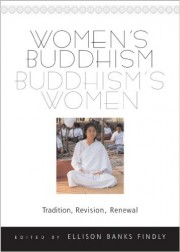 Tout au long de l’histoire du bouddhisme, les femmes ont été entravées dans leurs efforts pour réaliser la plénitude de leur vie spirituelle; elles affrontent davantage d’obstacles pour avoir la pleine ordination, ont moins de possibilités de cultiver des pratiques avancées, et reçoivent une moindre reconnaissance pour leurs accomplissements spirituels.
Tout au long de l’histoire du bouddhisme, les femmes ont été entravées dans leurs efforts pour réaliser la plénitude de leur vie spirituelle; elles affrontent davantage d’obstacles pour avoir la pleine ordination, ont moins de possibilités de cultiver des pratiques avancées, et reçoivent une moindre reconnaissance pour leurs accomplissements spirituels.
Here, a diverse array of scholars, activists, and practitioners explore how women have always managed to sustain a vital place for themselves within the tradition and continue to bring about change in the forms, practices, and institutions of Buddhism. In essays ranging from the scholarly to the personal, Women’s Buddhism, Buddhism’s Women describes how women have significantly shaped Buddhism to meet their own needs and the demands of contemporary life.
« A collection of 31 articles by 27 contributors, most of whom have strong academic credentials, is ably edited by Findly (Trinity College,CT) and presents short biographies, autobiographies, or memoirs of exemplary contemporary women Buddhists. Approaches range from popular to scholarly, but all articles are accessible to the general reader. The entire volume grew out of a conference held at Trinity in 1998 entitled ‘Women Changing Contemporary Buddhism.’ Perhaps the issue most frequently discussed is the fact that the women’s sangha (monastic community) long ago ceased to exist in the Theravada (South Asia) Buddhist area, and many would-be nuns are today seeking either to reestablish it or in other ways gain social and economic support for their spiritual aspirations, as expressed in their quests both for enlightenment and for a meaningful role in service to their religious constituencies. Related is the larger issue of the role of Buddhist women in the rapidly changing societies of Asia and the West, particularly the problem of remaining true to a tradition that is recognized to be embarrassingly patriarchal. These issues are handled with subtlety, passion, and compassion in this useful volume. Recommended for general readers; undergraduates; professionals and practitioners. » (Choice: Current Reviews for Academic Libraries)







